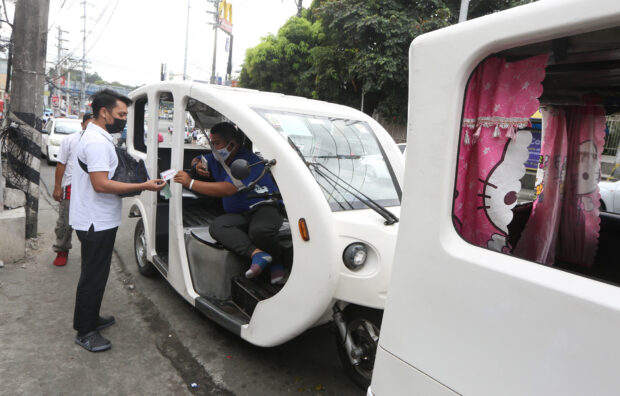(Photo by NIÑO JESUS ORBETA/Philippine Daily Inquirer)
MANILA, Philippines – President Ferdinand Marcos Jr. wants the Philippines to become a major player in the global electric vehicle (EV) industry, citing the country’s potential to become a manufacturing hub.
During a meeting with the Private Sector Advisory Council-JSG (PSAC-JSG) Employment Sector Cluster in Malacañang on Thursday, the President told business leaders that the Philippines is becoming part of the global electric vehicle manufacturing chain, noting the growth of electric vehicle manufacturing.
To maintain sales momentum, Marcos signed Executive Order No. 12 in January, temporarily exempting certain electric vehicles such as cars, buses, minivans, vans, trucks, motorcycles, tricycles, scooters, and bicycles from import duties.
According to the directive, import duties on certain auto parts will also be reduced or eliminated over the next five years. Previous tax rates ranged from 5% to 30%.
Presidential Communications Secretary Cheloye Velikaria-Garafil said that during a meeting with PSAC-JSG on August 17, the President asked the committee to submit a report on the further development of the full list of proposals from the country’s electric vehicle industry.
“PSAC-JSG intends to continue to study this proposal and continue to work with its advisors to provide the President with the best plan,” Garrafiel said.
PSAC is a group of business leaders created by Marcos to help his administration achieve the government’s economic goals.
Private sector leaders included Sabine Aboitiz of Aboitiz Equity Ventures Inc., Joey Concepcion III of RFM Corp., Alfredo Ayala of AC Education Inc., Rizalina Mantaring of Ayala Corp., Kevin Tan and Doris Teresita of Alliance Global Inc. Koson SM Investments Corp., SM Investments Corp.
Garafil said PSAC-JSG recommends conducting data-driven case studies to find the best opportunities in the EV value chain.
“The committee’s new recommendations include support for the government’s efforts to manufacture electric vehicles and a proposal to explore 17 opportunities for the development of the process and extractive industries, including mining in the electric vehicle value chain,” she said.
Garafil said that by 2026, global sales of electric vehicles are expected to surpass sales of non-electric vehicles, “profoundly changing a century-old industry.”
As electric vehicles become more popular, many parts of the cars will remain, but some of the most expensive parts will be replaced, she said. Garafiel said seven of the 18 common automotive parts for automobiles are made in the Philippines, including one of the four parts dedicated to internal combustion engines (ICEs).
She said the Philippines has huge opportunities in copper mining and refining, heavy copper component manufacturing, electrical component manufacturing, software development and expansion of delivery centers.
The Philippines has the world’s fourth-largest copper reserves and the three smelters are expected to increase production tenfold by 2027, Garrafiel said.
The country is also one of the world’s largest producers of nickel, another ingredient critical to the production of electric vehicle batteries.
The Energy Department has said it wants to continue allowing two- and three-wheeler electric vehicles into the country duty-free.
Patrick Aquino, director of the government agency Energy Development Authority, told reporters that the agency supports the inclusion of the electric vehicle segment in the government’s electric vehicle tax policy because it makes it easier for Filipinos to purchase electric vehicles.
“We are looking at legally registering more two- and three-wheelers,” Aquino told reporters last week at a press conference for the upcoming October 2023 Philippine Electric Vehicle Summit (PEVS).
According to the Land Transport Authority, by 2022, electric motorcycles and electric tricycles will account for 83.8% of the total number of electric vehicles in the country.
According to the Electric Vehicle Association of the Philippines (eVAP), there are over 16,000 electric vehicles in the Philippines today. Electric vehicle sales in the local market rose nearly sixfold in the first quarter of 2023 compared with the previous year, according to the business group.
Sales reached 2,536 units, thanks in part to a friendlier tax regime, falling prices for electric vehicles and a growing preference for greener lifestyles. Compared to 426 electric vehicles sold in all of 2022, the figure was 495.3% at the end of March.
According to eVAP, the number of electric vehicles in the Philippines is expected to grow to 6.61 million by 2030, with two-wheelers such as electric motorcycles still accounting for the majority of the total, reaching 83.1%.
Statement: The picture and text come from the Internet, compiled and published according to public information, reproduced for the purpose of disseminating information, if there is any infringement or violation, please contact us to delete. If you need to reprint or quote the materials of this article, please indicate the source.
Post time: Dec-27-2023

